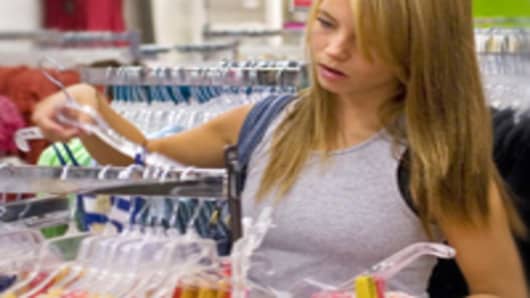Other teen apparel retailers also have posted steep same-store sales declines. Zumiez said its monthly same-store sales fell 16.8 percent, which was narrower than the 20.8 percent sales decline predicted by analysts surveyed by Thomson.
Hot Topic's monthly sales fell 8.5 percent, to narrowly outpace estimates. Analysts had predicted an 8.9 percent decline Thomson said.
But the declines at Abercrombie & Fitch were steeper than expected. Same-store sales tumbled 28 percent, a wider loss than analysts had expected. According to Thomson, same-store sales were estimated to be down 25 percent.
Warehouse clubstore Costco reported a bigger-than-expected 7 percent drop in same-store sales in July, hurt mainly by a strong U.S. dollar.
Analysts, on average, were expecting a decline of 6.7 percent, according to Thomson Reuters.
"The stronger U.S. dollar versus international currencies compared to last year resulted in an overall detriment in our reported July comps of 2.25 percent," a company executive said on a pre-recorded telephone message.
Same-store sales at its U.S. locations decreased 8 percent, while international division sales fell 5 percent.
Excluding gasoline price deflation, Costco said U.S. comparable sales would have been down 2 percent, while on a local currency basis international same-store sales increased 6 percent.
BJ's Wholesale Club faced a steeper decline than its competitor Costco with a same-store sales drop of 9.1 percent, versus the streets estimate of a 6.5 percent decrease.
The discount store Target fell in line with the pattern with sales dropping 6.5 percent, surpassing Thomson Reuters estimate of a 5.8 percent decrease.
However, Target CEO Gregg Steinhafel said the company's sales fell in line with their expectations.
"While our sales remain challenging, we continue to experience favorable gross margin performance within categories and disciplined expense control in our retail segment, as well as modestly improving risk trends in our credit card segment," said Steinhafel.
The high-end department store Saks stayed close to analysts' estimates, coming in at a decline of 16.3 percent, slightly below the expected 16.6 percent decline.


